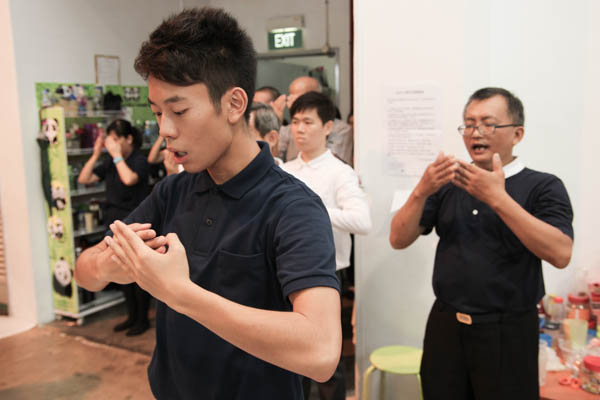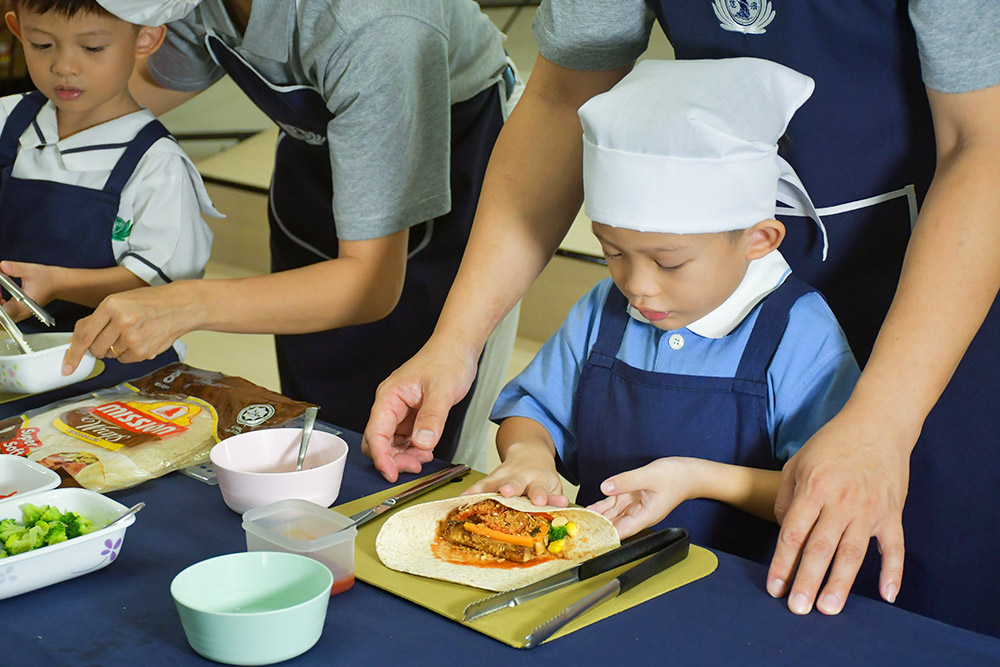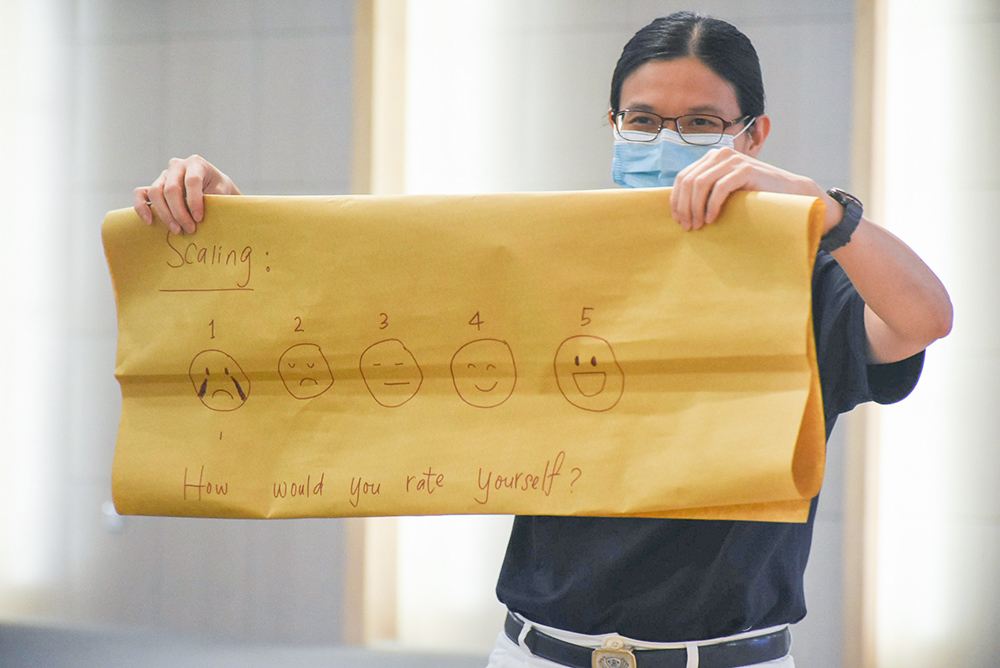
Luo Shu Fen (left), accompanied by Wang Li Fen, sharing her story at the Tzu Chi trainee commissioners’ learning retreat in July 2014. (Photo by Chua See Siew)
As cancer patient Luo Shu Fen calmly recounted the story of her illness, Wang Li Fang’s eyes were filled with love and concern even as she stood by quietly smiling. As the story progressed, Wang’s eyes brimmed over as she self-consciously wiped away the tears. Luo jokingly pointed out that Wang had succumbed to tears before her and patted Wang’s trembling back. It was evident how much sisterly love and support the two Tzu Chi volunteers had for each other.
When Luo was first told by the doctor that she had contracted second stage stomach cancer, her first reaction was shock before she quickly took hold of her emotions and calmed herself down. She expressed feeling very apologetic in the face of the help and support she received from her Tzu Chi family. At times, Luo could not bring herself to look directly into their eyes ─ because, being the windows to the soul, the eyes could speak volumes. It was the warmth, hopes and strength that she perceived from their gaze that gave her the courage to stand up again. She felt the love from them that flowed like a huge stream. Feeling that she was unable to repay their kindness, she could only continue on her path as a Tzu Chi volunteer to give back to others what she had received.
A Love that Mutually Supports
Luo and Wang got to know each other in Tzu Chi. They were both community volunteer leaders and from there they progressed to become as close as if they were family. Luo described Wang’s efforts as being “overwhelming” in her cancer journey. After the doctor’s diagnosis, at the point when Luo’s physical condition was unstable, the North Zone volunteers set up a care group, whose members took turns to visit her. Wang became the overall “custodian” and would roster the volunteers for visits. In order not to tire her out, a handphone alarm would be set to go off half an hour after visitors arrived, and she would hurry them to leave so that Luo could rest.
Luo remembered an instance when she accidentally let a pot of porridge boil over while she rested in the hall, creating a big mess on the floor. Wang had just arrived for a visit and without much ado, she went home to get an electric slow cooker, saying that it would make cooking porridge safer in future. One of the most touching memories Luo has is that of Wang carting over a 5kg bag of rice by herself and appearing at her doorway. Members of the Tzu Chi family were concerned over her nutritional needs, and Wang, hearing that rice from the northeast region of China was the most nutritious, took pains to buy some for her in hopes that it would help her recuperate after her operation.
When Wang was asked for the reason for her selfless devotion, she was unable to give a reply before finally settling for the answer: “No particular reason……(I) did not think too much about it.” Luo called Wang her pillar of support. In the past, both would cooperate as they participated in Tzu Chi activities, and this strong bond would extend to these challenging times.
Luo was also touched by the care shown by the rest of the volunteers. Seventy-year-old Zheng Shu Zhen braved the rain to bring her meals and would even enquire how many of her family members had not eaten dinner and bring the appropriate portions. Zheng also frequently brought over vegetables for Luo which she had grown herself. In the face of the concern shown by everyone, Luo hoped that she could recover so that she could repay their kindness by joining them in charitable activities.
Doing What is Right
As Luo shared her story, she spoke firmly and calmly without any trace of sadness. During her illness, she avoided negative thoughts and believed strongly that she would recover. Her faith stemmed from a Jing Si Aphorism that she had received from a fellow Tzu Chi volunteer: “Blessing is about the joy that comes from giving. Wisdom is about the inner peace we gain from being understanding.” She understood this to be a teaching from Dharma Master Cheng Yen and felt that this was a sign that she still had contributions to make as her time was not up yet. Thinking thus, her fear vanished.
During the period when she was recuperating, many members of the Tzu Chi family prayed for her, and this gave her the determination to carry on. She was grateful that before her illness struck, she had the opportunity to participate in the Sutra Adaptation of the Water Repentance Text, where she learned about the karmic law of cause and effect. Luo says that without Tzu Chi, her life would have been very different.
With this belief, she returned to the fold of Tzu Chi and continued with her work as part of the home visit team where she would share her own story with those that had hit a low point in their life. Luo remembered that during a particular home visit, the sickly beneficiary who was beset with multiple ailments spoke with deep resentment about all his misfortunes. Luo was able to calm him down and steer him towards positivity just by sharing her own story. Through this way, Luo felt that her illness was “worth it” as it had a practical value.
Not long after Luo was diagnosed with cancer, she called for a meeting of new volunteer leaders at her house so that she could assign them some tasks. At that time, she was feeling weak and did not have the physical strength to carry out those tasks herself. Initially hesitant, they immediately agreed to help out after the meeting. She recalled feeling comforted by the words of volunteer leader Zhuang Wei Lun who said that all he wished for was for her not to be too burdened by worries.
For terminally ill patients, family support is most important and Luo is grateful for what her husband has done. On the day of her operation, he was so worried that his blood pressure rose and he needed his son to drive him home to rest. He would also get anxious if she so much as grimaced and clutched her belly.
Luo realized that if one did not have a healthy body, one would be unable to carry out one’s filial duty to take care of one’s parents. It finally dawned on her that this is the reason why during mealtimes at Tzu Chi events, volunteers would first place a bowl of rice at their own seating place before passing it down to others ─ it signifies Master Cheng Yen’s wish that volunteers first ensure their own health before they can have the ability to take care of others.

Since July 2014, Luo and Wang have been leading volunteers in a promotional activity at a marketplace along Bangkit Road, introducing Jing Si products to the public. (Photo by Huang Fu Shun)

Luo (with hand raised) thanks her team of 24 volunteers at the end of an activity that promotes Right Faith and correct beliefs about the seventh lunar month. (Photo by Huang Fu Shun)

Luo Shu Fen and her husband Wang Wei Xun, an enterprise manager, got to know of Tzu Chi when they visited the Jing Si book hut in Chinatown in April 2006. (Photo by Seow Beng Lan)

Both Luo and Wang can be regularly seen at Tzu Chi activities lending a hand. (Photo by Xu Zhen Yao)



